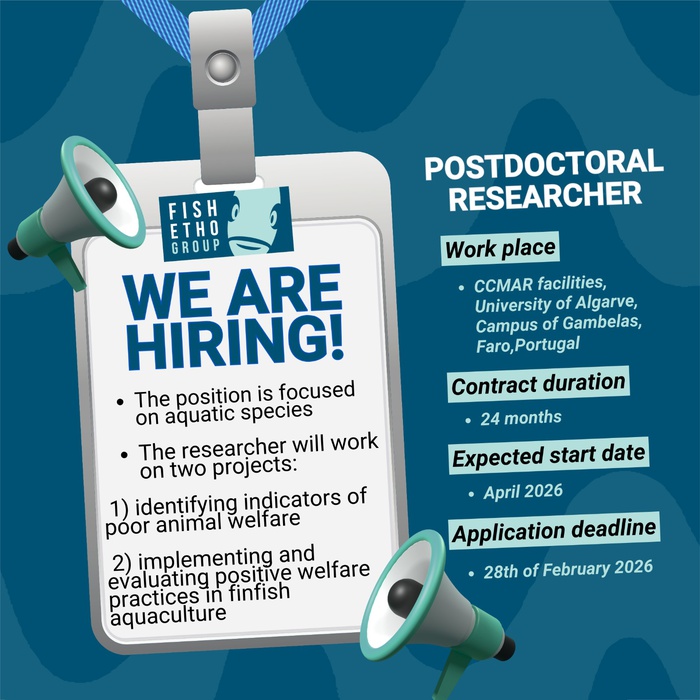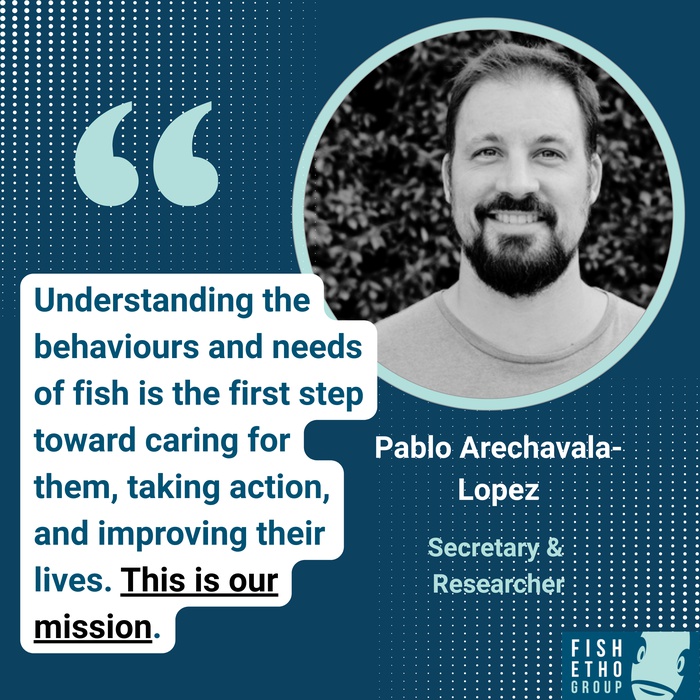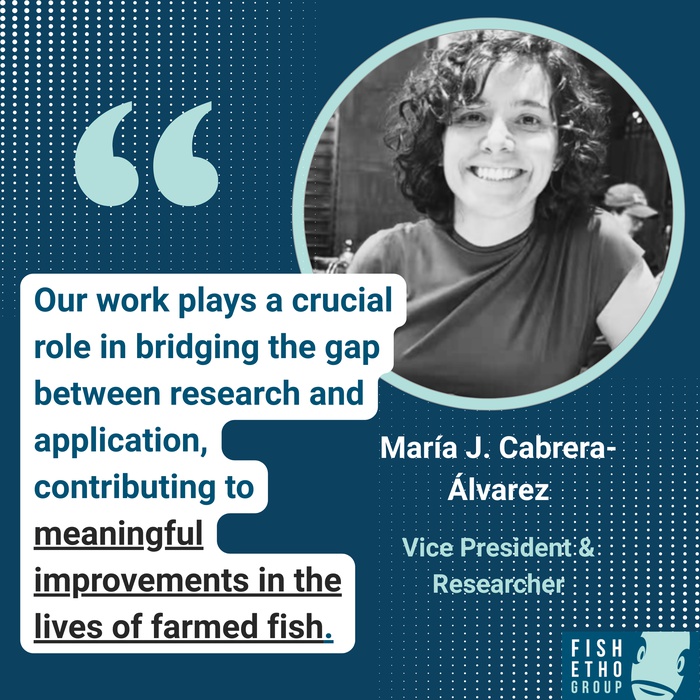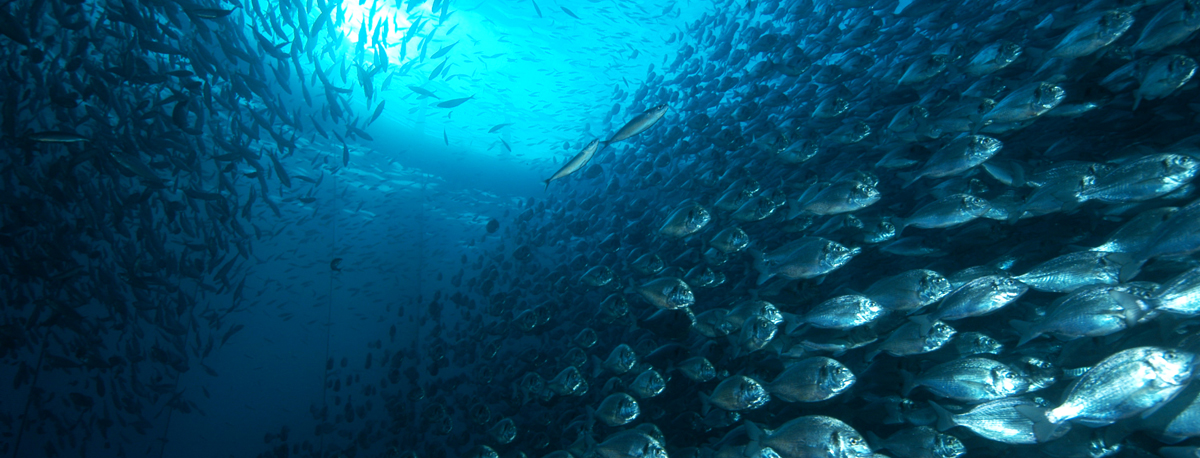Some words from our Consultancy and Training Manager
> A strong message from Fábio Manuel Barroso Sousa, Consultancy and Training Manager at FishEthoGroup, highlights a core principle guiding our work:
“The way fish are managed depends on how well we understand their behavioural and physiological needs. When we invest in strengthening expertise and building capacity, we move away from viewing fish as numbers within a system and toward recognising them as living animals.”
At FishEthoGroup, we are a non-profit association dedicated to improving the welfare of aquatic animals across aquaculture and fisheries. Our mission is to ensure that scientific knowledge is not only generated, but effectively translated into practical improvements.
We bridge science and practice through four key pillars:
🔬 Scientific research
🎓 Training & events
🤝 Consulting
📢 Science communication
Capacity building and technical expertise are essential to advancing fish welfare across sectors.
(posted on Feb. 12, 2026)

We are hiring! Postdoctoral Researcher – Fish Welfare in Aquaculture
> About the FishEthoGroup
The FishEthoGroup (FEG) is an internationally recognised non-profit association focused on advancing fish welfare through applied ethological research and close collaboration with aquaculture and fisheries stakeholders.
> Candidate profile
We are looking for a postdoctoral researcher with:
* A PhD in aquaculture, fish ethology, fish physiology or a related discipline
* Knowledge of animal welfare science and proven experience in fish welfare
* Knowledge of aquaculture production systems
* Strong independence and excellent communication skills in English
> What we offer
* Integration into a European consortium of leading research institutions
* Opportunities to contribute to high-impact publications and welfare guidelines
* Access to training, exchange programmes and professional development
* A flexible, autonomy-oriented and supportive research culture
* A competitive salary, commensurate with experience and in line with national regulations
> How to apply
Interested candidates should send a CV (max. 3 pages) and a cover letter (max. 1 page) to
📩 careers@fishethogroup.net
📄 Key information is available in the link here.
(posted on Feb. 9, 2026)
New blog post!
> The grass carp (Ctenopharyngodon idella) is a herbivorous freshwater species naturally found in rivers, lakes, and reservoirs in China and Russia.
As one of the four major Chinese carps, it is among the most widely farmed freshwater species globally and has been introduced into more than 50 countries for aquaculture and aquatic weed control. Despite its economic and ecological importance, common farming practices may raise significant welfare concerns for this species.
🔎 Learn more in our latest post on the ConsCIÊNCIA Animal blog here.
📊 You can also consult the WelfareCheck profile for grass carp in the fair-fish database here.
(posted on Feb. 4, 2026)
Some words from our Science Outreach Manager
> These words from Caroline Marques Maia, Science Outreach Manager & Researcher at FishEthoGroup, reflect a core principle behind our work.
FishEthoGroup is a non-profit association dedicated to improving the welfare of aquatic animals, from aquaculture to fisheries. Our mission is to ensure that scientific knowledge is not only generated, but effectively translated into real and practical improvements for fishes and other aquatic species.
“Working on fish welfare means recognising fish as animals with their own behavioural needs, and ensuring that this understanding is reflected in how scientific knowledge is shared,” says Caroline.
> This perspective underpins our work at FishEthoGroup and guides how we bring science closer to practice through four key pillars:
🔬 Scientific research
🎓 Training & events
🤝 Consulting
📢 Science communication
(posted on Jan. 28, 2026)
🎙️ New episode of the fair-fish database programme – Fish Talk podcast
The fair-fish database programme features short audio episodes based on species profiles already published in the fair-fish database. Each episode provides concise insights into fishes’ natural needs, behaviour, and key welfare challenges in fisheries or aquaculture.
Our latest episode focuses on Skipjack tuna (Katsuwonus pelamis) caught by pole-and-line and hand line fishing, with a newly published profile in the catch branch of the database.
> Listen to the episode here.
(posted on Jan. 22, 2026)
New blog post!
The skipjack tuna (Katsuwonus pelamis) is a pelagic species with a cosmopolitan distribution in tropical offshore waters. Widely consumed around the world—both fresh and in processed forms—it is one of the most heavily exploited fish species globally, in terms of tonnage, with an estimated annual catch of nearly 3 million tonnes.
💡In our latest post on the ConsCIÊNCIA Animal blog, we explore the welfare impacts of hand line and pole-and-line fisheries targeting skipjack tuna, discussing key welfare risks and potential improvements to reduce suffering in these fishing methods.
🔗 Read the full article here.
🔗 Access its WelfareCheck profile in the fair-fish database here.
(posted on Jan. 20, 2026)

Some words from our Secretary!
> These words from Pablo Arechavala-Lopez, Secretary and Researcher at FishEthoGroup, highlight a fundamental principle behind our mission.
As a non-profit association, we are dedicated to improving the welfare of aquatic animals across aquaculture and fisheries. Our work focuses on ensuring that scientific knowledge becomes practical, effective change — for fishes and other aquatic animals.
“There is no better way to understand an animal than by observing it. Only when we stop and look carefully can they tell us how they live, how they relate to their environment, and what we can do to improve their living conditions, all the way to the end,” says Pablo.
This perspective is embedded in our four key pillars:
🔬 Scientific research
🎓 Training & events
🤝 Consulting
📢 Science communication
(posted on Jan. 16, 2026)
> New paper published!
🐟 Fishes are among the most diverse vertebrates and provide a valuable model for understanding the evolution of cognition. The paper “ManyFishes: a big team science collaboration on fish comparative cognition” presents ManyFishes, the first large-scale, international collaboration focused on comparative cognition and behaviour in fishes.
Our team member María J. Cabrera-Álvarez contributed to this initiative, which promotes big team science, open research practices, and standardized methodologies to address long-standing challenges in fish cognition research. The paper also aims to raise awareness of the ManyFishes initiative and encourage researchers to engage in future collaborative projects.
> Read the paper here and learn how to get involved.
(posted on Jan. 14, 2026)
> We are pleased to announce the launch of the first Hong Kong Aquatic Animal Welfare Guide!
Disseminating science-based knowledge is essential to improving the welfare of farmed fish and other aquatic species in a practical and applicable way. Clear and accessible communication is key to translating scientific evidence into real-world impact.
We proudly present 'Enhancing Hong Kong's Aquaculture Competitiveness: The New Trend of Aquatic Animal Welfare — a milestone publication for Hong Kong’s aquaculture sector.
💡Developed with contributions from María J. Cabrera-Álvarez from our team, the guide demonstrates how science-based welfare practices can simultaneously support economic performance, environmental protection, and societal expectations.
> This first edition aims to foster dialogue and collective learning, offering practical guidance while establishing a baseline for welfare and quality in Hong Kong’s aquaculture.
> Access the full guide here.
(posted on Jan. 8, 2026)
Season's Greetings!
Happy Holidays! 🎄☃️
From all of us at the FishEthoGroup, we extend our warmest wishes for Christmas and the New Year. As we look ahead to 2026, we remain committed to advancing the welfare of both captive and wild-caught fish — through scientific research, knowledge sharing, consultancy, and training.
> Thank you for your support and collaboration throughout this year.
> We look forward to continuing this journey together in 2026!
(posted on Dec. 22, 2025)
New podcast episode!
> Sharing scientific knowledge about fish and other aquatic species is at the heart of our work. We believe that outreach plays a crucial role in improving animal welfare.
💡As part of these efforts, we developed Fish Five, a dedicated interview programme within our Fish Talk podcast. Each episode invites leading experts to explore fish behaviour and welfare through five thought-provoking questions.
We are pleased to announce the release of our third episode, featuring Professor Lynne Sneddon, who discusses key topics related to pain and suffering in fishes. This episode offers valuable insights for researchers, professionals, and anyone involved in aquatic animal welfare.
> Listen to the full episode on Spotify or visit our podcast page.
(posted on Dec. 17, 2025)

Some words from our Vice President!
> These words from María J. Cabrera-Álvarez, our Vice President, highlight the core purpose behind our mission at FishEthoGroup.
As a non-profit association, we are dedicated to improving the welfare of aquatic animals across aquaculture and fisheries. Our work focuses on ensuring that scientific knowledge becomes practical, effective change — for fishes and other aquatic animals.
“These efforts — from developing practical enrichment strategies to identifying humane slaughter methods — all aim to support farmers and ensure scientific knowledge becomes real improvements in fish welfare”, says María.
This vision is embedded in our four key pillars:
🔬 Scientific research
🎓 Training & events
🤝 Consulting
📢 Science communication
(posted on Dec. 9, 2025)
New papers out!
> Two new papers out!
Advancing fish welfare requires robust, science-based evidence — and our team has just published two studies that contribute to both aquaculture and wild capture fisheries.
📄 Study 1 — Biologging assessment of behavioural and physiological responses of European seabass
Using biologgers, we monitored locomotion, heart rate, acceleration and oxygen consumption during swimming and crowding challenges. These data allowed us to identify four welfare states, demonstrating the strong potential of biologging for fish stress response and welfare monitoring.
📄 Study 2 — Purse Seine Capture of Small Pelagic Species: A Critical Review of Welfare Hazards and Mitigation Strategies
Our review maps welfare hazards across all phases of purse seine operations — including prospection, setting, capture, hauling, emersion, gear release, sorting, storage, and stunning and slaughter — for Atlantic herring, Peruvian anchoveta, Atlantic chub mackerel, and Atlantic mackerel. We also highlight key mitigation measures.
📖 Read the full papers here and here, respectively.
(posted on Dec. 5, 2025)
New blog post!
> When discussing animal welfare, we often emphasize reducing suffering. While this is essential, promoting positive welfare states is equally important.
Scientific evidence has shown that fishes not only feel pain, fear, and anxiety, but also experience positive affective states. This highlights the need to enrich the environments in which they live.
💡 In the latest post on The Fish Mind section on the ConsCIÊNCIA Animal blog, we explore how environmental enrichment strategies can promote positive stimulation for captive fishes and contribute meaningfully to their welfare.
The Fish Mind, developed by FishEthoGroup, shares scientific insights into fish sentience, cognition, and the emotional lives of these remarkable animals.
> Read the post here
(posted on Dec. 2, 2025)
New podcast episode in Portuguese!
> One of our key activities is developing scientific dissemination strategies to share knowledge related to the welfare of fishes and other aquatic species.
Within this scope, The Fish Mind is a programme of our podcast Fish Talk, dedicated to communicating scientific information about the capacity of fishes to suffer, to experience positive and negative affective states, and to demonstrate remarkable cognitive abilities. The goal is to present this knowledge through a short, accessible and informal dialogue.
💡We have just released our third episode about positive affective states in Portuguese, focusing on the impacts of environmental enrichments in fishes. Scientific evidence consistently shows that enriching environments can significantly enhance behaviour and welfare in farmed fishes.
You can listen to the new episode here:
> Spotify
(posted on Nov. 26, 2025)


